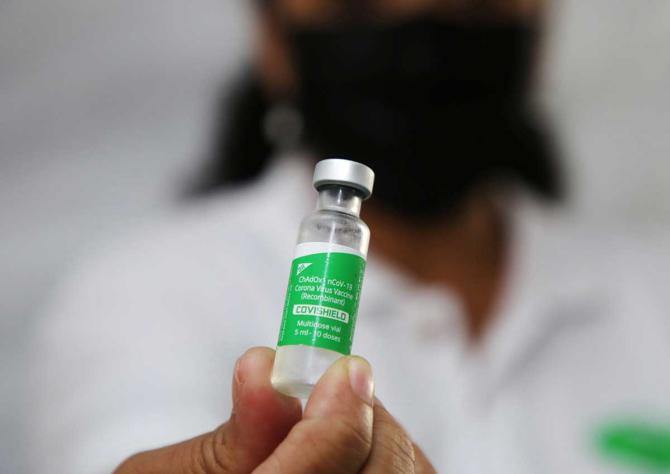The Centre on Thursday approved extending the gap between the two doses of the Covishield vaccine to 12-16 weeks following a recommendation from a government panel, and said it is a 'science-based decision' taken with confidence that there will be no extra risk.

However, the National Technical Advisory Group on Immunisation (NTAGI) has suggested no change for the dosage interval for Covaxin, the ministry said.
'Based on the available real-life evidences, particularly from the UK, the COVID-19 Working Group agreed for increasing the dosing interval to 12-16 weeks between two doses of Covishield vaccine.
'No change in interval of Covaxin vaccine doses was recommended,' the ministry said.
The present gap between two doses of Covishield, manufactured by the Serum Institute of India, is 6-8 weeks.
The Hyderabad-based Bharat Biotech's indigenously developed Covaxin and Oxford-AstraZeneca's Covishield, being manufactured by the Pune-based SII, are currently being used in India's inoculation drive against coronavirus.
The central government's move comes amid reports from several states about shortage of COVID-19 vaccines.
Some states and UTs have also reported that they had to suspend its vaccination drive for 18-44 years in view of the scarcity.
While Maharashtra decided on Wednesday to suspend its drive to vaccinate people in the age group of 18 to 44 years in view of vaccine shortage, Delhi also temporarily shut Covaxin-administering centres for this age group as it has run out of stock.
Several states and UTs including Delhi, Maharashtra, Karnataka and Telangana have also decided to opt for global tenders for procurement of anti-coronavirus shots with the domestic supply falling short to meet the rising demand.
Asserting that it has been a 'science based decision' taken based on the recommendations of the NTAGI, V K Paul, member (Health) NITI Aayog said as per studies, initially the dosage interval between two doses of covishield was 4 to 6 weeks but then as more data became available secondary analysis showed increasing the dosage interval to 4 to 8 weeks can have some 'advantage'.
NTAGI is a standing committee which was constituted much before COVID-19 had emerged and works on immunization for children, Paul said, and added that 'it looks at scientific data and we must respect the decision of this institution. They make independent decision'.
They had seen that the UK by that time had already extended it to 12 weeks and WHO also had said the same, but many nations had not changed the dosage pattern, Paul noted.
At that time our science based technical committee anchored by the Indian Council of Medical Research along with DBT by looking at the available data felt breakthrough infections may increase if the gap is increased beyond eight weeks, Paul said.
"So in good faith, based on science, without any pressures, they increased the dosage interval to 4 to 8 weeks. Now based on the available real-life evidences, particularly from the UK, the decision to extend it from 6-8 weeks to 12-16 weeks has been taken with confidence that there will not be an extra risk" he said.
"This is a dynamic decision and, part of periodic review," Paul added .
Asked if the efficacy of the vaccine will be affected with this extension, Paul said, "The efficacy is so good even after the single dose...it's not a problem at all."
This is the second time in the past few months that the interval between the two doses of Covishield has been increased. In March, the Union health ministry had asked states and UTs to increase the gap from 28 days to 6-8 weeks.
"The recommendation of the COVID-19 Working Group was accepted by the National Expert Group on Vaccine Administration for COVID-19 (NEGVAC)....in its meeting on May 12, 2021," the ministry said.
The COVID-19 Working Group is chaired by Dr N K Arora, who is director at the INCLEN Trust.
Its members include Dr Rakesh Agarwal, Director and Dean, GIPMER, Puducherry; Dr Gagandeep Kang, professor, Christian Medical College, Vellore; Dr Naveen Khanna, Group Leader, International Centre For Genetic Engineering And Biotechnology (ICGEB), Jawaharlal Nehru University, New Delhi; Dr Amulya Panda, Director, National Institute of Immunology, New Delhi; and Dr V G Somani, Drugs Controller General of India (DCGI).
Earlier in the day, the NTAGI recommended increasing the gap between two doses of Covishield to 12-16 weeks and said that pregnant women may be offered the choice to take any vaccine.
It also stated that those having laboratory test proven SARS-CoV-2 illness should defer COVID-19 vaccination for six months after recovery.
The panel rejected the proposal for routinely screening all vaccine recipients with rapid antigen testing prior to COVID vaccination.
The NTAGI recommended that all pregnant women visiting for ANC care may be informed about risks and benefits associated with Covishield and Covaxin.
Based on the information provided, a pregnant woman may be offered the choice to take any of the COVID 19 vaccine.
An educational tool comprising information on risk of COVID 19 infection during pregnancy, benefits associated with the vaccination and rare complications associated with vaccines like thrombosis and thrombocytopenia (with Covishield) may be developed.
Also, all lactating women are eligible to receive the COVID 19 vaccines any time after delivery, the panel suggested.
According to the current vaccination protocol, pregnant and lactating women should not be administered the shots as they have not been part of any anti-coronavirus vaccine clinical trial so far.
In case of individuals who have received the first dose and before completion of the dosing schedule if they test positive for COVID-19, they should wait for 4-8 weeks after clinical recovery from the illness.
Also, COVID-19 patients who have been given anti-SARS-CoV-2 monoclonal antibodies or convalescent plasma may defer COVID-19 vaccination for three months from the day of discharge from hospital, the recommendations stated.
Individuals having any other serious illness requiring hospitalisation or ICU care should also wait for 4-8 weeks before getting the next COVID vaccine, it added.











 © 2025
© 2025